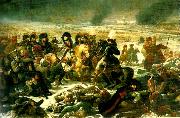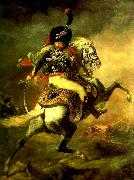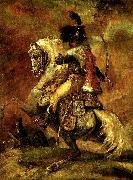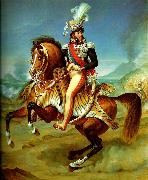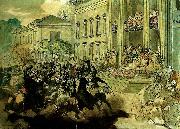antoine jean gros El petróleo que Pinta la ReproducciónAll antoine jean gros Oil PaintingsBaron Antoine-Jean Gros (16 March 1771 ?C 25 June 1835), also known as Jean-Antoine Gros, was both a French History and neoclassical painter. Born in Paris, Gros began to learn to draw at the age of six from his father, who was a miniature painter, and showed himself as a gifted artist. Towards the close of 1785 Gros, by his own choice, entered the studio of Jacques-Louis David, which he frequented assiduously, continuing at the same time to follow the classes of the College Mazarin. Bataille d´Aboukir, 25 juillet 1799, 1806, (detail).The death of his father, whose circumstances had been embarrassed by the French Revolution, threw Gros, in 1791, upon his own resources. He now devoted himself wholly to his profession, and competed (unsuccessfully) in 1792 for the grand prix. About this time, however, on the recommendation of the École des Beaux Arts, he was employed on the execution of portraits of the members of the National Convention, and disturbed by the development of the Revolution, Gros left France in 1793 for Italy. |
|||

|
|||
|
|
|||
|
||||||||
| antoine jean gros Baron Antoine-Jean Gros (16 March 1771 ?C 25 June 1835), also known as Jean-Antoine Gros, was both a French History and neoclassical painter. Born in Paris, Gros began to learn to draw at the age of six from his father, who was a miniature painter, and showed himself as a gifted artist. Towards the close of 1785 Gros, by his own choice, entered the studio of Jacques-Louis David, which he frequented assiduously, continuing at the same time to follow the classes of the College Mazarin. Bataille d´Aboukir, 25 juillet 1799, 1806, (detail).The death of his father, whose circumstances had been embarrassed by the French Revolution, threw Gros, in 1791, upon his own resources. He now devoted himself wholly to his profession, and competed (unsuccessfully) in 1792 for the grand prix. About this time, however, on the recommendation of the École des Beaux Arts, he was employed on the execution of portraits of the members of the National Convention, and disturbed by the development of the Revolution, Gros left France in 1793 for Italy. |
||||||||
|
|
||||||||
| Pintura identificación:: 68879 napoleon on the battlefield of eylau 1808 oil on canvas 533x800cm se |
||||||||
|
|
||||||||
| Pintura identificación:: 69482 le chasseur de la garde se |
||||||||
|
|
||||||||
| Pintura identificación:: 69483 le chasseur de la garde se |
||||||||
|
|
||||||||
| Pintura identificación:: 69484 murat, roi de naples se |
||||||||
|
|
||||||||
| Pintura identificación:: 69496 la revue de louis av champ-de -mars se |
||||||||
|
|
||||||||
| ARTISTA PREVIO PROXIMO ARTISTA | ||||||||
|
|
||||||||
|
antoine jean gros Baron Antoine-Jean Gros (16 March 1771 ?C 25 June 1835), also known as Jean-Antoine Gros, was both a French History and neoclassical painter. Born in Paris, Gros began to learn to draw at the age of six from his father, who was a miniature painter, and showed himself as a gifted artist. Towards the close of 1785 Gros, by his own choice, entered the studio of Jacques-Louis David, which he frequented assiduously, continuing at the same time to follow the classes of the College Mazarin. Bataille d´Aboukir, 25 juillet 1799, 1806, (detail).The death of his father, whose circumstances had been embarrassed by the French Revolution, threw Gros, in 1791, upon his own resources. He now devoted himself wholly to his profession, and competed (unsuccessfully) in 1792 for the grand prix. About this time, however, on the recommendation of the École des Beaux Arts, he was employed on the execution of portraits of the members of the National Convention, and disturbed by the development of the Revolution, Gros left France in 1793 for Italy. |
||||||||
|
|
||||||||
|
CONTACTE EEUU |





